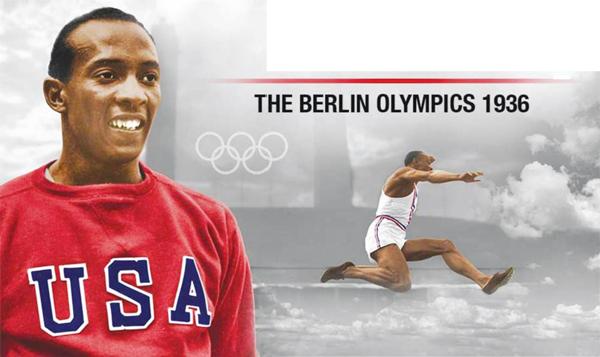
Jesse Owens was an American track and field athlete who won four gold medals at the 1936 Olympic Games.
Owens specialised in the sprints and the long jump and was recognised in his lifetime as “perhaps the greatest and most famous athlete in track and field history”.
He set three world records and tied another, all in less than an hour, at the 1935 Big Ten track meet in Ann Arbor, Michigan—a feat that has never been equalled and has been called “the greatest 45 minutes ever in sport”.
International fame
He achieved international fame at the 1936 Summer Olympics in Berlin, Germany, by winning four gold medals: 100 metres, long jump, 200 metres, and 4 × 100-metres relay.
He was the most successful athlete at the Games and as a black American man, was credited with “single-handedly crushing Hitler’s myth of Aryan supremacy”. However, Hitler did not shake hands with any athletes that day and as Owens said “I wasn’t invited to the White House to shake hands with the President, either.”
As a youth, Owens took different menial jobs in his spare time: he delivered groceries, loaded freight cars and worked in a shoe repair shop while his father and older brother worked at a steel mill. During this period, Owens realised that he had a passion for running.
Throughout his life, Owens attributed the success of his athletic career to the encouragement of Charles Riley, his junior high school track coach at Fairmount Junior High School. Since Owens worked in a shoe repair shop after school, Riley allowed him to practice before school instead.

Owens first came to national attention when he was a student of East Technical High School in Cleveland; he equalled the world record of 9.4 seconds in the 100 yards (91 m) dash and long-jumped 24 feet 9+1⁄2 inches (7.56 m) at the 1933 National High School Championship in Chicago.
May 25, 1935 is remembered as the day when Jesse Owens established four world records in athletics. Owens achieved track and field immortality in a span of 45 minutes on that day, during the Big Ten meet at Ferry Field in Ann Arbor, Michigan, where he set three world records and tied a fourth.
He equalled the world record for the 100-yard dash (9.4 seconds) (not to be confused with the 100-metre dash) and set world records in the long jump (26 feet 8+1⁄4 inches or 8.13 metres, a world record that would last for 25 years); 220 yards (201.2 m) sprint (20.3 seconds); and 220-yard low hurdles (22.6 seconds, becoming the first to break 23 seconds).
Both 220 yard records may also have beaten the metric records for 200 metres (flat and hurdles), which would count as two additional world records from the same performances. In 2005, the University of Central Florida Professor of Sports History, Richard C. Crepeau chose these wins on one day as the most impressive athletic achievement since 1850.
Racist regime
On December 4, 1935, NAACP Secretary Walter Francis White wrote a letter to Owens but never sent it.
He was trying to dissuade Owens from taking part in the 1936 Summer Olympics in Nazi Germany, arguing that an African American should not promote a racist regime after what his race had suffered at the hands of white racists in his own country. In the months prior to the Games, a movement gained momentum in favour of a boycott.
In 1936, Owens and his United States team mates sailed on the SS Manhattan and arrived in Germany to compete at the Summer Olympics in Berlin. According to fellow American sprinter James LuValle, who won the bronze in the 400 metres, Owens arrived at the new Olympic stadium to a throng of fans, many of them young girls yelling “Wo ist Jesse? Wo ist Jesse?” (“Where is Jesse? Where is Jesse?”).
Just before the competitions, founder of Adidas athletic shoe company Adi Dassler visited Owens in the Olympic village and persuaded Owens to wear Gebrüder Dassler Schuhfabrik shoes; this was the first sponsorship for a male African American athlete.
On August 3, Owens won the 100 m dash with a time of 10.3 seconds, defeating a team mate and a college friend Ralph Metcalfe by a tenth of a second and defeating Tinus Osendarp of the Netherlands by two-tenths of a second. On August 4, he won the long jump with a leap of 8.06 metres (26 ft 5 in) (3¼ inches short of his own world record).
He later credited this achievement to the technical advice that he received from Luz Long, the German competitor whom he defeated. On August 5, he won the 200 m sprint with a time of 20.7 seconds, defeating team mate Mack Robinson (the older brother of Jackie Robinson).
On August 9, Owens won his fourth gold medal in the 4×100 m sprint relay when head coach Lawson Robertson replaced Jewish-American sprinters Marty Glickman and Sam Stoller with Owens and Ralph Metcalfe, who teamed with Frank Wykoff and Foy Draper to set a world record of 39.8 seconds in the event. Owens had initially protested at the the last-minute switch, but assistant coach Dean Cromwell said to him, “You’ll do as you are told.”
Owens’s record-breaking performance of four gold medals was not equalled until Carl Lewis won gold medals in the same events at the 1984 Summer Olympics in Los Angeles. (TBR)
